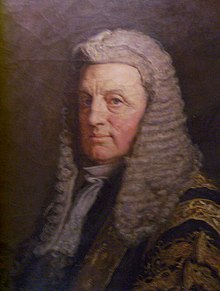William Brett, 1st Viscount Esher
William Baliol Brett, 1st Viscount Esher , PC , QC (born August 13, 1815 in Lenham , Kent , † May 24, 1899 in London ) was a British lawyer , judge and politician of the Conservative Party .
Family and education
Brett was born in 1815 to Pastor Joseph George Brett of Chelsea and his wife Dorothy Best. He had seven siblings, five brothers and two sisters. On April 3, 1850, he married Eugenie Mayer with whom he had two sons and a daughter. Brett received his education at Westminster School , King's College London and Gonville and Caius College at the University of Cambridge . There he was a member of the Cambridge University Boat Club and won the Boat Race with his team in 1839 against the team from the University of Oxford . In 1840 he completed his training with a Magister Artium .
Professional background
Political commitment
In the same year, Brett received his barrister license . In 1861 he was appointed crown attorney . After Richard Cobden's death , Brett ran as a Conservative Party candidate for the general election in the Rochdale constituency in 1865 , but lost to Thomas Bayley Potter . In a by-election in 1866 he was sent to the House of Commons for the constituency of Helston under strange circumstances. Both candidates initially received exactly the same number of votes. After the polling officer cast his vote, Brett's opponent was declared the winner by one vote. When reviewing the election process, however, the House of Commons found that the election supervisor's vote was cast after the election was over and stipulated that both candidates should move into the House of Commons. In 1868 Brett was promoted to Knight Bachelor and appointed Solicitor General by Benjamin Disraeli . However, he only held this office for a little over eight months. During this time he was prosecuting the leaders of the Fenian Uprising of 1867.
Activity as a judge
In August 1868, Brett was appointed judge on the Court of Common Pleas . In this position he was exposed to severe criticism because of the harsh sentences he imposed. Even so, he rose to the post of judge on the Court of Appeal in 1876 . At the same time, Brett became a member of the Privy Council . In 1883 he followed George Jessel to the position of Master of the Rolls . Associated with this was the elevation to the nobility as Baron Esher, of Esher in the County of Surrey . In this position he was instrumental in the development of case law and legislation. He supported a law that should strengthen the rights of the British bar associations and advocated that members of the House of Lords , even after they had retired due to old age, could still attend meetings and vote. In late 1897, Brett retired. Because of his merits, he was appointed Viscount Esher, of Esher in the County of Surrey by Queen Victoria .
Late years
Brett died in London in 1899. The title of Viscount Esher passed on to his eldest son, Reginald .
Web links
- William Baliol Brett, 1st Viscount Esher on thepeerage.com , accessed August 21, 2015.
Individual evidence
- ^ Walter Bradford Woodgate: Boating . Longmans, Green, and Co, London 1888, pp. 255-256. Text archive - Internet Archive
- ^ A b c Esher, William Baliol Brett, 1st Viscount . In: Encyclopædia Britannica . 11th edition. tape 9 : Edwardes - Evangelical Association . London 1910, p. 768 (English, full text [ Wikisource ]).
- ↑ London Gazette . No. 23359, HMSO, London, 6 March 1868, p. 1519 ( PDF , English).
- ↑ London Gazette . No. 23417, HMSO, London, August 28, 1868, p. 4733 ( PDF , English).
- ↑ London Gazette . No. 24389, HMSO, London, 1 December 1876, p. 6673 ( PDF , English).
- ↑ London Gazette . No. 25493, HMSO, London, 1 December 1885, p. 6673 ( PDF , English).
- ↑ London Gazette . No. 26910, HMSO, London, November 12, 1897, p. 6227 ( PDF , English).
| predecessor | Office | successor |
|---|---|---|
| New title created |
Viscount Esher 1897-1899 |
Reginald Brett |
| personal data | |
|---|---|
| SURNAME | Brett, William, 1st Viscount Esher |
| ALTERNATIVE NAMES | Brett, William Baliol, 1st Viscount Esher (full name) |
| BRIEF DESCRIPTION | British lawyer, judge and Conservative Party politician |
| DATE OF BIRTH | August 13, 1815 |
| PLACE OF BIRTH | Lenham , Kent |
| DATE OF DEATH | May 24, 1899 |
| Place of death | London |
